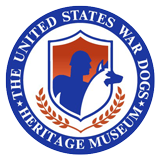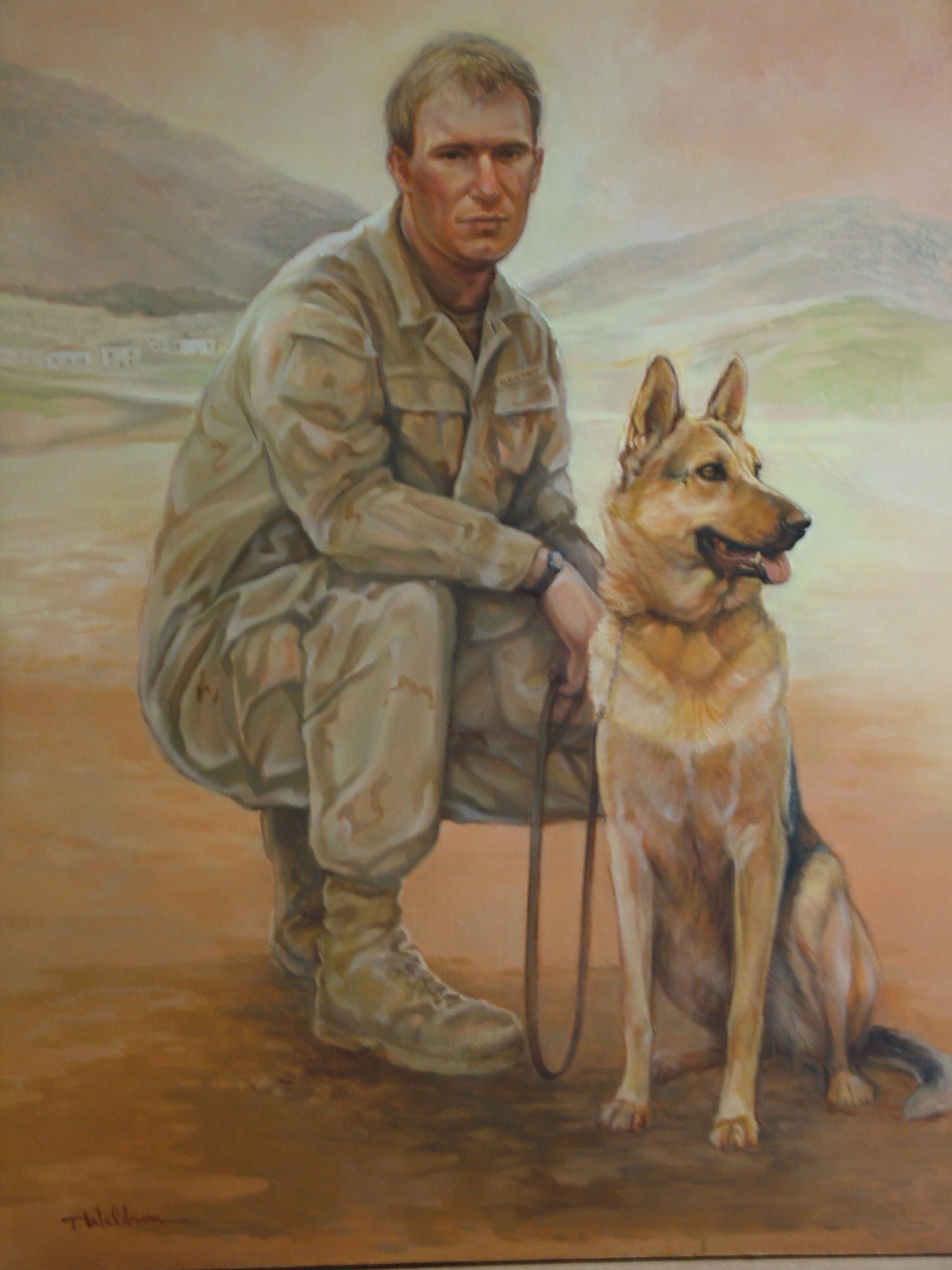Mothers Day, May 11, 2003: Ron Aiello
I first learned of Fluffy’s plight on Mothers Day, May 11, 2003 when Russell Joyce phoned me and told me a story about Fluffy in Iraq and how Russell had to leave Fluffy behind.
Russell was concerned for Fluffy’s safety and asked me to help him with trying to get Fluffy to the United States. What I heard in Russell voice was something that I had heard hundreds up hundreds of times from former canine handlers who had served in Vietnam.
I heard the love that Russell had for this canine and I could tell that a bond had formed between the two of them.
I myself like thousands of handlers who served in Vietnam had to leave my canine Stormy behind in Vietnam and I felt I owed it to Stormy to help Fluffy get out of Iraq and to the United States.
I told Russell that I would do what ever I could to help him to get Fluffy to the United States. I had also received an email from Russell which confirmed what we had talked about on the telephone
Email From: SFC Russell Joyce
To whom it may concern:
I’m in 3rd group Special Forces out of Fort Bragg, NC. I have just returned
from Iraq today. While in Iraq, my team requested a dog for operational
purposes. The Kurds brought us a German Shepard breed that had obviously
been abused and neglected by the Iraqi military. I became the handler for
this dog and grew very attached to him. This dog was used in many combat
operations in Northern Iraq and proved to be a wonderful “soldier.” It was
my team that took control over the mountain north of Mosul (Maclube
mountain). Anyway, I obtained all of the proper paperwork to have the dog
shipped to the US so that I could adopt it but at the last minute there was
some problem with politics. The dog meets all requirements to be shipped to
the US. I only have 72 hours to find some way to get the dog released for
travel and cut through this red tape or the dog will be destroyed. I have
personally trained this dog for special military use and now the dog does not
like Kurds or Iraqi persons, therefore, they will not be able to handle him.
All I need is some help in getting this animal here to the states, I will
handle all of the expenses that it takes to get him here. I have a copy of
all medical records, vaccinations, and orders for the dog. I can send a copy
of this paperwork to anyone that can help me. I am a prior Ranger and
currently a Special Forces soldier and our motto is “Never leave a fallen
comrade”. The military asked for this dog to serve, this dog lived through 2
shootings, mine fields, and all military actions in the North. Now, they are
ready to discard him, I can’t let that happen and I’m hoping that he can live
his retirement with me here in the US. Please contact me if you can help or
know of anyone who can.
My 72 hours started on May 11 at 12 noon.
Thank you again,
SFC Russell W. Joyce
Fort Bragg, NC
A mission to reunite Fluffy the war dog with his human
By LISA HOFFMAN
Scripps Howard News Service
May 16, 2003
– He’s an adopted commando dog with the improbable name of Fluffy, a fast learner who served nobly during combat in northern Iraq.
Now, his best friend is battling to bring the war dog home to the country for which he fought.
“This dog was used in many combat operations in northern Iraq and proved to be a wonderful ‘soldier,’ ” U.S. Sgt. 1st Class Russell Joyce, an Army special forces soldier, wrote in a plea for help with his mission to have Iraq-born Fluffy “live his retirement with me here in the U.S.”
Air Force and Army officials are sympathetic, but it is proving neither a quick nor easy thing to approve Joyce’s unconventional request. There are strict rules – military, health, customs and others – about bringing animals into the United States, and the fact that Fluffy, in effect, enlisted on the battlefield just complicates matters more.
“We are trying to work something out,” Maj. Gary Kolb, a spokesman for the U.S. Special Operations Command in Fort Bragg, N.C., said Thursday. On Friday, the unofficial word was that the two might be reunited sometime “in the near future.”
Fluffy’s still-unfolding saga began when Joyce’s unit, working behind-the-scenes in the Mosul area, needed a canine to provide security for the soldiers and otherwise help them in their battle to oust Saddam Hussein’s regime.
Trained to improvise on the battlefield, these elite troops didn’t requisition an Army working dog; instead, they asked their local allies, the ethnic Kurds, to find them one. The Kurds brought back a malnourished German shepherd who apparently had been maltreated by the Iraqi army.
Assigned to be the dog’s handler, Joyce, 35, gave the young animal his irreverent name, set to teaching him English as his second language and added pounds to the scrawny dog’s frame and trust to his heart.
By Joyce’s account, the dog – who he estimates is no older than 2 years – took to his new life with enthusiasm and performed admirably as Joyce’s team fought for control of a mountain north of Mosul. Joyce said he and Fluffy went through several “shootings and a minefield” together.
When it came time for Joyce to come home, he scrambled for permission for Fluffy to accompany him. He had the dog immunized and checked out by Army veterinarians, and got initial Army permission for the dog to leave.
But bureaucratic roadblocks developed, and Joyce had to come home alone. He found temporary quarters for Fluffy with the Army’s 506th Security Force Squadron, a dog-handling team now based in Kirkuk.
That unit, however, couldn’t keep Fluffy for long. Joyce feared the dog would be euthanized within days, or simply turned back to the Iraqis, whom Fluffy had been trained by Joyce to dislike.
So from virtually the moment he returned home to Fort Bragg last Sunday, Joyce, who is married and the father of two, mounted a frantic effort to find a way to cut through the red tape and bring Fluffy over via Air Force transport. He offered to foot the travel bill himself.
For help, he contacted the U.S. War Dogs Association, a group of former GI dog handlers familiar with the deep devotion that grows between dogs and soldiers in combat, as well as with the pain of leaving their canine comrades behind.
“He was so upset. You could hear the desperation,” said group president Ron Aiello, who walked “point” on patrol in Vietnam for 13 months with his beloved Stormy, who he said saved his life countless times.
While the U.S. armed forces have used combat canines since World War I, it was in Vietnam that they really earned their stripes. More than 4,000 dogs served in that long, jungle war, where they are believed to have saved 10,000 U.S. soldiers, and were so effective that the Viet Cong offered a $20,000 bounty for their capture – twice as much the reward paid for a GI, according to war-dog histories.
But at the end of the war, barely 200 of those four-legged troops were brought home to the United States. Thousands were deemed surplus “equipment” by the Pentagon and either euthanized by the U.S. military, turned over to the South Vietnamese army or simply abandoned.
That fate still gnaws at the veterans who, to a man, say they owe their lives to their dogs and found leaving them behind the hardest thing they have ever done.
“As a Vietnam veteran, I don’t want that to happen again,” George Augustine, of Sarasota, Fla., wrote in an e-mail this week, one of thousands of messages from veterans and animal advocates that flooded the in-boxes of Secretary of Defense Donald Rumsfeld on down this week.
“I think that the origin of the dog is irrelevant,” Augustine wrote. “The dog served the Army and now I think he should be reunited with his trainer.”

Iraqi war dog gets to retire with SF handler
by Staff Sgt. Marcia Triggs
WASHINGTON (Army News Service, May 20, 2003) — An Iraqi-born German shepherd, who put his life on the line to guard U.S. Special Forces, escaped euthanasia and will soon travel to the United States to retire.
Sgt. 1st Class Russell Joyce, the Special Forces soldier from Fort Bragg, N.C., nursed the malnourished and abused dog from northern Iraq back to health and trained him. The dog guarded Special Forces soldiers who accomplished missions like taking control of Maqlub mountain, and removing the last of Mosul’s defenses.
Upon arriving back to Fort Bragg, Joyce frantically sent out two e-mails to friends and family asking for help to get the faithful guard dog, Fluffy, shipped to the United States.
Those e-mails somehow traveled through cyberspace and reached numerous war dog associations and members of congress, who are lobbying to get Fluffy a ticket to the States.
An Air force Squadron at Kirkuk Air Base, Iraq, is currently taking care of Fluffy. However, as soon as the Department of Agriculture and the Office of the Secretary of Defense approves Fluffy’s flight, he will begin his journey to the states, officials said. Approval is practically guaranteed as agencies from the Department of Defense, Army, Air Force and the consultant to the Army surgeon general for Veterinary Clinical Medicine scurry to expedite Fluffy’s retirement.
Fluffy’s fate was first in question May 11. He wasn’t allowed to board the homeward-bound plane with the Special Forces soldiers.
“We purchased him from the Kurds to perform military operations, but the officer in charge of loading said that since he didn’t originate in the States, and wasn’t on order, he was not authorized to travel to the U.S.,” Joyce said.
“Myself, and other people on my team, tried to explain that an Army veterinarian said Fluffy was fit for travel, and that I had the proper paperwork to prove it.”
Joyce left Fluffy with an Air Force K-9 unit, but he was told that the unit could only hold onto the Shepherd for 72 hours.
“As his handler, I grew attached to him, but the reason I really wanted to see him in the States was because he supported us the whole time we were in Iraq,” Joyce said.
“He walked guard with every American soldier in our compound, all night long. He chased stray dogs away. He never ran at the sound of bullets, and we were safe because he was there,” Joyce said. “He was a deterrer, and that’s an immeasurable success.”
Fluffy joined Joyce’s team with visible scars on his head and legs, weighing about 31 pounds and missing his front two bottom teeth. The full-breed shepherd spent his first night with the Special Forces so scared that he didn’t move, Joyce said.
The soldiers only had two weeks to prepare Fluffy for duty, but he impressed the team by catching onto the commands very quickly and warming up to his new owners. He was trained to guard and be a pursuit dog. Upon release from his handler, he could chase and bring down a perpetrator.
“There’s no dog food in Iraq,” Joyce said. “So we all shared our food with him, and fed him out of the palm of our hands. He was never aggressive toward us, and his first name, Tariq Aziz, was not befitting of his character.”
Tariq Aziz is the name of Saddam Hussein’s foreign minister and is the eight of spades in the Iraqi leaders most wanted deck of cards. Aziz was the longest serving member of Hussein’s regime but was captured April 25.
“I wanted a name for him that wasn’t too macho, and didn’t have so many syllables,” Joyce said. “The first thing that came to mind was Fluffy, and eventually everyone started calling him by that name.”
Fluffy traveled from the most northern part of Iraq, to the south, past the front lines, onto the edge of Mosul guarding his team members wherever they laid their heads.
The reason Fluffy will be allowed to travel to the United States is not based on a sympathetic military that feels for a soldier who was at risk of losing his dog. A U.S. military working dog about to be euthanized at the end of his useful life may be adopted by his former handler according to a law established by Congress Nov. 6, 2000, said Air Force Col. Fred Pribble, the special assistant for International and Security Affairs.
Not only is Joyce and his family anxiously awaiting the arrival of Fluffy, but also are veteran dog handlers who remember having to leave their four-legged comrades behind.
“I spend all night answering e-mails and phone calls from veterans who have fought in past wars,” Joyce said.
“Bringing Fluffy to the States isn’t about me,” Joyce said. “It’s about the men who weep on the phone while they talk about the relationship they had with the dogs who served with them in war.”
| Air Force helps Iraqi dog immigrate
by Airman 1st Class Stephanie Hammer
437th Airlift Wing Public Affairs
6/3/2003 – CHARLESTON AIR FORCE BASE, S.C. (AFPN) — A German shepherd of Iraqi descent arrived here May 30 aboard a C-17 Globemaster III after putting his life on the line to guard U.S. special forces.
Fluffy, a dog from northern Iraq with visible scars, will retire at Fort Bragg, N.C., as an honorary military working dog.
When Fluffy first joined Sgt. 1st Class Russell Joyce, a special forces soldier and Fluffy’s trainer, he weighed about 31 pounds and was missing his front two bottom teeth. But after only two weeks, he was put to work.
Fluffy, who takes no apparent offense to his unlikely name, was an “immeasurable success” as a military working dog.
“I asked the Kurdish (fighters) if we could have a dog,” said Joyce. The Kurds brought him “Tariq Aziz,” named after Iraq’s deputy prime minister, but the name did not last long.
“I was joking around, and I said, ‘you know what, I’m going to call him Fluffy. My dog’s name is Fluffy,’” said Joyce. “One person started calling him that, myself, and two people started calling him that; it just stuck.”
The full-breed shepherd began his career learning a few simple commands before becoming a guard and pursuit dog.
“Having a person on roving patrol is a great thing, but adding the sense of smell and the sense of hearing that a dog has really heightened the sense of awareness to early detection,” said Joyce.
“He’s been in harm’s way and shot at more times than anyone on my team,” Joyce said. “He proved himself to be a worthy asset. He means a lot to me because we definitely went through a lot over there together.”
Eager for retirement, Fluffy arrived in the United States escorted by Maj. Jim Pompano from the 615th Air Mobility Squadron at Travis Air Force Base, Calif., who happened to be returning home from the area.
Pompano was able to make sure the dog’s transition went smoothly.
“We waited until all the t’s were crossed and the i’s were dotted and we had the proper paperwork, then we got the dog home,” Pompano said. “I just happened to be leaving at the same time, so I decided the best thing I could do was just escort Fluffy (to the United States).”
Although Fluffy did not like the takeoff or landing much, Pompano said he did pretty well on the flight home.
“I talked to Fluffy just like I would talk to anyone else,” he said. “He was pretty well trained, and I didn’t have any problems there.”
Fluffy was greeted on the flightline by his supporters who sent hundreds of e-mails, letters and made phone calls supporting his safe immigration to the United States.
“I think that America as a whole had a big hand in this, and it’s really a gift from the United States to me and a gift to Fluffy to be able to come home,” said Joyce. “This dog really gets the opportunity for a fresh start here.” (Staff Sgt. Marcia Triggs, Army News Service, also contributed to this story.) |



